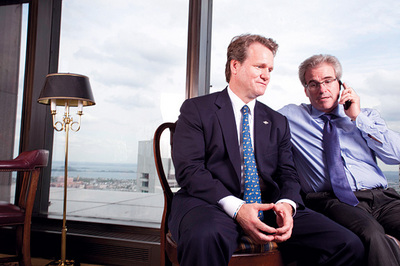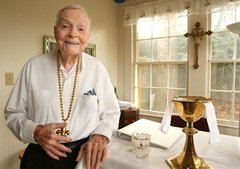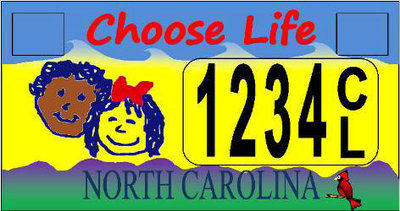 You’d be hard-pressed to find a more unusual pair of brothers: one may be the most powerful banker in the United States, while the other is a missionary trying to change the world.
You’d be hard-pressed to find a more unusual pair of brothers: one may be the most powerful banker in the United States, while the other is a missionary trying to change the world.
Both are graduates of Brown University, where the alumni magazine has just profiled them:
At first glance, the only things the brothers Patrick and Brian Moynihan appear to have in common are a Brown education and Irish Catholic, middle-class, Midwestern parents. Patrick is a Catholic missionary and director of the Louverture Cleary School, a coed Catholic boarding school outside Port-au-Prince, Haiti. Intense, garrulous, and outspoken, Patrick is not hesitant about seeing the hand of God at work in his life. “I’m a catalyst for conversion,” he says. “I’m not the person to invite to dinner if you want everything to stay the same.”
Brian is arguably the most powerful banker in the United States. Earlier this year, after a long career at Bank of America, he was named its president and CEO. Where as Patrick is tall and lean, with a square jaw and animated good looks, Brian is more compact, more quietly handsome and subdued. He oversees $2.25 trillion in assets. He speaks softly and quickly, as if he swallows his words as he speaks them. Those who know him well say that he weighs his words carefully before he speaks. Where Patrick is extroverted and loud, constantly in motion, Brian is reserved and humble. Where Patrick believes in the power of one man to change the lives of millions, Brian demurs, insisting that each of us plays only a small role in a large system. Brian, his brother says, “of course is trying to stay out of the Boston Globe. I like being in the Globe.”
What unites the Moynihan brothers is the Haitian Project, which began in the early 1980s from an idea developed at St. Joseph’s Parish in Providence. A group of parishioners wanted to provide some kind of aid to Haiti, and eventually the notion of addressing the country’s lack of quality free education came up. The Louverture Cleary School was founded to provide a secondary education to some of the poorest but most highly motivated children in Haiti, on the condition that the children find ways to give back, to help improve their country.
The Moynihans have chosen to help the Haitian Project in contrasting ways, and the choices they have made in their lives illuminate two very different approaches to success. Like so many Brown graduates, they have given careful thought to how they most effectively make a difference in the world. Brian makes a lot of money and targets a significant amount–more than $150,000 last year alone–to keeping the Haitian Project solvent. As a missionary and a church deacon, Patrick makes comparatively little money. He likes to say he earns in a year what Brian earns in a day, and he’s done the math to prove it. He believes this is the way it should be: Brian reaps “the rewards of a meritocracy. I personally decline those, when offered.” Instead, Patrick believes that to change the world, you have to roll up your shirtsleeves and become directly and fully involved in your passion.
From one point of view, Brian could be seen as just another greedy banker, his generous charitable donations a way to assuage his conscience, while Patrick would seem to be the committed and sacrificing activist. Or Patrick could be seen as a hopeless and self-promoting idealist, while Brian is the realist, supporting his cause out of the good fortune his career has sent his way. Neither is true. In fact, how we see Brian and Patrick may say as much about oursociety’s own clichéd view of success as it does about the two of them.
Read on at the link.

